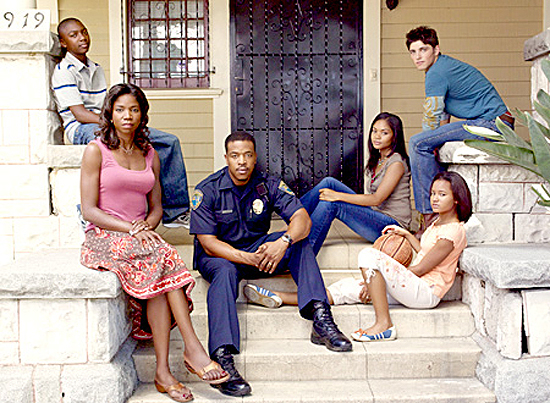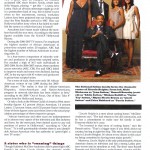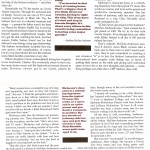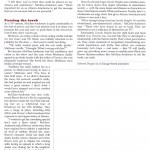
Prepare for future by looking at past
By Deborah Douglas
Winter 2010
In a TV landscape lacking meaningful Black images, Kathleen McGhee-Anderson and her cast shine a welcome light.
Click through the television channels, and—still —very little Black and Brown and good is going on after all the study, protest and time wasted in front of the screen. As viewers, we allow ourselves to be force-fed like fat-livered ducks, headed for a slaughtering of our collective narrative and the image we project around the world. We digest, like so many empty calories, the faux-realities of Frankie & Neffe, Flavor of Love and The Real Housewives of Atlanta. And to make it worse, somebody is green-lighting this stuff.
To make that even worse, African American viewers who know better actually watch—justifying it as akin to gaping at a car crash — and talk about what they saw, casting these tales of the triflin’, stupid and greedy into the universe, where they threaten to infect us all.
To be fair, African American audiences do value realness. That preference likely explains why professional sports and reality shows that require talent, training and effort, such as Dancing With the Stars, rate so highly in our communities.
It is true also that ensemble shows have done a better job of integrating African Americans into their lineups in authentic roles. Think, for example, of Taye Diggs and Audra McDonald, stars of ABC’s drama Private Practice.
On a case-by-case basis, the TV landscape looks better for Latinos, too. ABC’s V is a coup for us all when a Latina in the form ofMorena Baccarin, a native Brazilian, plays the smart, secretive and strategic alien from outer space. And who among us doesn’t get excited when actors who were practically kids when they came on the Ene have regular work, like Lourdes Benedicto and Morris Chestnut. They play a loving interracial couple on the same series, generating much heat in their frequent kisses and embraces.
But when one takes a broader look at portrayals of America’s fastest-growing ethnic group, the view is grim. Take, for example, the critically acclaimed ABC show Modern Family, which stars Sofia Vergara, playing — get this — a sassy, sexy Latina. Such an obvious stereotype might go over in a postmodern kind of way, but it doesn’t cut it when so few mainstream, normal, workaday Latinos have been projected into our living rooms since the Frito Bandito arrived in 1967. How can Hollywood affect irony when it has failed to establish the norms on which that irony is based?
Anecdotes don’t mean much without the numbers that tell the true story. According to the latest figures available from the NAACP Hollywood Bureau: During the 2006-2007 TV season, Fox employed the highest number of African Americans in prime-time scripted series: 20 regulars. ABC had the highest number of African Americans in recurring roles: 32.
In a four-season comparison of minority writers and producers in prime-time scripted series, Fox reached a high of 56.5 such individuals in 2003-2004. By the 2006-2007 season, these numbers across networks (ABC, CBS, Fox and NBC) failed to improve much and some even declined, leaving ABC in the top spot with 43 writers and producers in prime-time scripted series.
For a sense of scale, there were only 161 African American writers of out 3,088 during the 2005- 2006 season: “The reality is that for African-Americans, Hispanics, Asian-Americans and Native-Americans, progress in network television has been relative at best,” according to the 2008 “Out of Focus, Out of Sync: Take 4” report from the Hollywood bureau.
Or take a look at the Writers Guild of America West membership figures: 4.2 percent African American; 1.6 percent Latino; 1.5 percent Asian; and 0.32 percent Native American.
None of these figures come anywhere close to the actual population percentages of these respective groups.
“African-Americans and other races are underrepresented in almost every aspect of the television and film industry and have, for the most part, been denied access to any real positions of power in Hollywood,” according to “Out of Focus.” “It is still questionable whether there is any identifiable African-American who has authority to ‘green-light’ a new TV series.” A sister who is “running” things Though Kathleen McGhee-Anderson didn’t green-light ABC Family’s hit show Lincoln Heights, she certainly wields formidable power as executive producer and show runner (a.k.a.: the person who does all the hiring, firing, approving, disapproving, etc., and is involved in the writing). In short: This woman is The Man.
“Lincoln Heights is a story about coming home,” McGhee- Anderson says. “The dad returns to his old community, and he has a commitment to make sure his family is safe.
Everyone thinks he’s crazy.
“I’m invested in that story of coming home,” says the Detroit native. “That’s a bigger story if you think about our country, having to right the ship. This story doesn’t start and stop in Lincoln Heights. It’s about every citizen in this country being committed to having some major growth.” Moreover, Lincoln Heights is the only predominately African American drama on television and has a strong Latino presence woven into its storylines as well. The show stars Russell Hornsby and Nicki Micheaux as the Suttons, a loving middleclass couple raising three children in a fictional gritty, urban California town where Hornsby’s character, Eddie, a cop, grew up. The family had a chance to live in a more posh suburb, but they chose to live someplace where their relationships and loysceneAlties run deep, and where they can make a difference. Of course, nobody says so because that would be corny. But their actions prove the point. For example, Lizzie, played by Rhyon Nicole Brown, volunteers at an outreach center. Anybody and everybody can feel free to show up and ask for help at the Sutton residence — and they often do.
Remarkably for TV, the stories on Lincoln Heights ring true. Through the universal lens of family, viewers can see one of TV’s most nuanced portrayals of Black life. Tay, the Suttons’ teen son, is a talented musician and singer — a passion his father wasn’t too keen on. Played by Mishon Ratliff, Tay is moving into manhood and has to learn to stand up for himself against neighborhood toughs. But he’s got his dad watching his back. And last season, Eddie Sutton found out he had fathered a son during a long-ago relationship.
The Suttons immediately accepted that son, now grown, with complications, of course, but in a way that mimics the true-life embrace many Black families experience every day.
Oldest daughter Cassie contemplated losing her virginity to her boyfriend, Charles. She eventually chose to have sex, the same choice many real-life high-school seniors choose to make. However, viewers got to see Cassie, played by Chicagoan Erica Hubbard, do the emotional work it takes to make such a weighty decision.
“For Cassie and Charles, it’s about being true to who she is and following her path, hearing her inner voice and hearing the conviction of her inner voice,” McGhee- Anderson says.
Micheaux’s character, Jenn, is a refreshing departure from the typical TV mom. She works as a nurse, and is an active parent and productive community member. She has streaks of jealousy, rolls her eyes and gets flustered in a way Clair Huxtable never quite managed to do.
“[Clair] never got pissed at her husband,” McGhee-Anderson says. “I just wanted her to get pissed at Cliff. We try to do that with Lincoln Heights. Even though Jenn can differ with Eddie, behind it all she is 100 percent behind her man.” That’s cultural, McGhee-Anderson says.
And it doesn’t mean Black women take a back seat to their men or aren’t equal partners; they’re just committed to working it out, whatever “it” is. In fact, the Suttons’ interaction really deconstructs how couples work things out, in terms of putting their issues on the table and giving each individual space to have his or her own thoughts and opinions — something perhaps one other show, CBS’ Medium, does well.
“Black women have a wonderful way of loving and supporting our men so they feel empowered,” she says. “I think the perception and stereotype about us is that African American women don’t stand behind their men, that they’re just as much a problem as the problems men face in real society. I didn’t see that with my parents; I don’t see that with my friends. I think Russell and Nicki grab onto that vision.” Micheaux adds that the Suttons are interesting parents, too. Three-dimensional TV moms are the exception, not the rule: “She’s not a normal TV mom,” Micheaux said during a phone interview, herself a working mother of two who was issuing a “stop-quit-don’t-do-that” command to little Simone as she talked. “A lot of women can really identify with Jenn and how she has to prioritize. You see how she kind of juggles it, focusing back on the kids.” That this show also feels warm and the people look good is a tribute to McGhee-Anderson’s careful nurturing of every aspect of the show. There’s no function in which she is not involved, from setting the tone, approving scripts, hiring directors, managing budgets, casting actors, developing sets — name it and McGhee-Anderson’s stamp is on it.
“I love my job; it’s the most creative job,” says McGhee- Anderson, whose affection requires her to work 12-hour days, though many of her cast members swear she works many more.
“I started off wanting to be a film director, but I started with being a film editor,” she says.
“I went to Spelman College, and was in the Spelman-Morehouse Players with Sam Jackson and LaTanya Richardson. To have it all come together has been a dream come true for me because writing is at the heart of all I do.” All she does is, well, everything. Audiences may not know it, but they’ve experienced her creativity before. McGhee-Anderson was executive producer of Soul Food and a consulting producer for Touched By An Angel and Any Day Now. She got her start writing for Little House on the Prairie, then on such sitcoms as Amen, 227 and Webster, to name just a few.
She was once “encouraged” to avoid being so ambitious. After college, she became a Detroit Free Press intern and was doing pretty well when she told her editor of plans to move to Hollywood to become a TV and film writer.
“She told me I could never succeed in Hollywood, to be realistic . . . A young Black girl? It was impossible,” McGhee- Anderson said. “I was also a playwright. I’ve written films, television . . . I’ve never wanted to just concentrate on just one aspect and think about one track.” McGhee-Anderson’s careful planning and refusal to fail Are traits she came by honestly. Her grandparents fought a legal battle against restrictive housing covenants that went all the way to the Supreme Court, where Thurgood Marshall successfully argued their case. McGhee-Anderson’s college teachers and administrators ignited and cultivated her curiosity for all things creative.
“I felt there was no limit that could be placed on my dreams and aspirations,” McGhee-Anderson said. “That’s important for us as African Americans to get the message that we can succeed and we are powerful.” Passing the torch As a TV veteran, McGhee-Anderson is quite comfortable in the seat of power, and she’s not afraid to use it or share it to promote her cast and crew or push them to the next level, even if they don’t want to go.
Micheaux, an acting veteran whose acting credits include Six Feet Under and The Shield, was initially reluctant to do publicity for the show — that wasn’t exactly her thing.
“We really needed press, and she was really pushy,” Micheaux recalls. “I thought ‘What’s wrong with her?’” But because McGhee-Anderson had the confidence and vision in her show and her cast, when Micheaux finally agreed to go shake hands with the editor of Essence, she was pleasantly surprised. She loved the show, Micheaux says; media coverage ensued.
“Kathleen has really helped me as a person in Hollywood trying to have a career,” Micheaux said. “You have to take bold steps. If we didn’t champion the show, the network wouldn’t really.
She had pushed me and inspired me and been a great mentor. I don’t think I would have stepped out of my comfort zone without her.” McGhee-Anderson has also influenced Rhyon Brown’s life by supporting her efforts to make her own film and taking her on a whirlwind tour of Broadway for her 17th birthday. They saw a range of plays, including Billy Elliott and Ruined, which broadened her exposure to and appreciation of theater.
“I wanted to get her something special; she’s such a fierce talent,” McGhee- Anderson said of Brown, whose story lines have required her to display a sophisticated level of subtlety beyond her years.
Brown’s character Lizzie has dealt with death, loyalty, racism, classism and crime.
Brown even got to display her running skills during an episode in which a drug dealer was chasing her in the neighborhood where she tutored small children.
For Brown, McGhee-Anderson is a mentor and heroine. She’s learned how to treat people within the show’s hierarchy equally and with respect, and it’s paying off. For example, McGhee-Anderson has supported Brown’s dream to get on the other side of the camera. Brown just finished filming her movie, The Ties That Bind, at the same studio where Lincoln Heights is filmed. She recalls: “The guy initially said I couldn’t do it. Then he said, ‘Is that the little girl who always walks around here smiling?’ It really showed me it matters how you treat people. Kathleen showed me that.” Viewers can only hope Lincoln Heights sets a similar example for future shows that depict minorities in mainstream society — with the same hopes and dreams as characters on shows that feature mostly White performers. Finally, here’s a wholesome yet edgy show that gives African Americans and Latinos a voice and a face.
“We’re trying to keep it real on Lincoln Heights. It’s not this white-bread, one-dimensional culture,” McGhee-Anderson says. “Those who have found us are so loyal. They are refreshed to see a reflection of themselves on TV.” Fortunately, Lincoln Heights has the right heart and head behind it so viewers, too, can feel like they’ve developed a relationship with the Sutton family. That’s what good stories do. They create moments of recognition, broadcasting universal experiences and truths that reflect our common humanity. Let’s hope — and insist — that TV will finally grow up, providing more venues to enable more Black and Brown decision-makers like McGhee-Anderson to tell the truth, our truth.
Deborah Douglas is a Chicago-based journalist.



